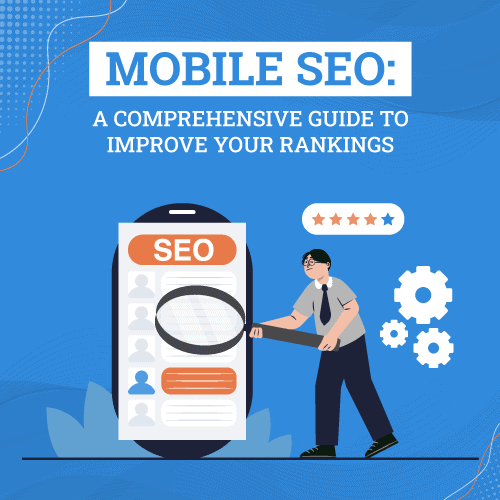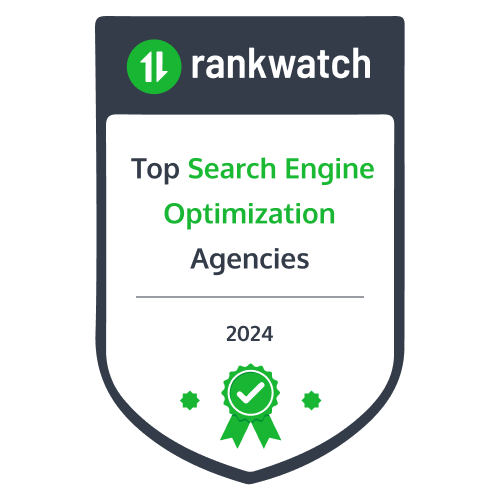
Are you ready to up your SEO game and drive your website to the top of search engine results? Understanding and tracking the right SEO Key Performance Indicators (KPIs) is important for achieving and maintaining a successful online presence. They help identify any issues with the website and help you keep tabs on organic traffic, keyword ranking, conversions, ROI, etc.
But first, let’s have a clear picture of SEO KPIs. These metrics are the backbone of any successful SEO campaign, offering valuable insights into your website’s performance and visibility in search engine results pages (SERPs). Each KPI provides a unique perspective on your SEO efforts, from organic traffic and keyword rankings to backlinks and conversion rates.
By monitoring these metrics regularly, you can identify trends, pinpoint areas for improvement, and optimize your SEO strategy for maximum impact. Whether you’re a seasoned SEO pro or just starting, mastering these KPIs will help you stay ahead of the competition and achieve your online goals. Once you have resolved the issues on your website, you’ll see positive results with the help of the SEO KPIs listed in our blog.
Important KPIs To Track SEO
SEO KPIs help marketers identify places where the SEO strategy is winning and places where improvements are required. In order to stay ahead of your competitors, you should regularly evaluate top SEO KPIs, ensuring they are measuring the metrics accurately.
Below are the 9+ important SEO KPIs a business should track:
Organic Traffic

Organic traffic is one of the crucial KPIs for SEO that helps in measuring the number of visitors that visit the website from organic search results. It is considered one of the important metrics because growth in organic traffic indicates that your website has reached the main SEO objective, thereby implying that a growing number of people are seeing as well as visiting your website.
You can easily track your daily searches for the incoming traffic to the website with Google Analytics:
Step 1: Acquisition
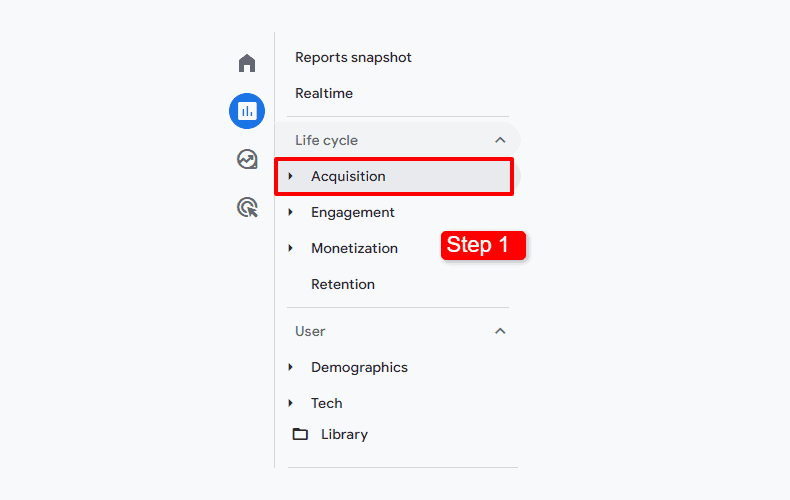
Step 2: Click on the ‘Traffic acquisition’
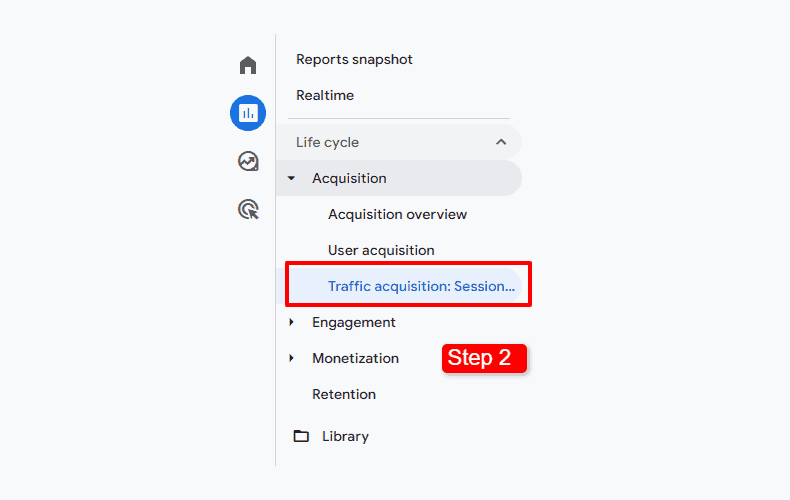
Step 3: Select the Select dimension ‘First User Medium’
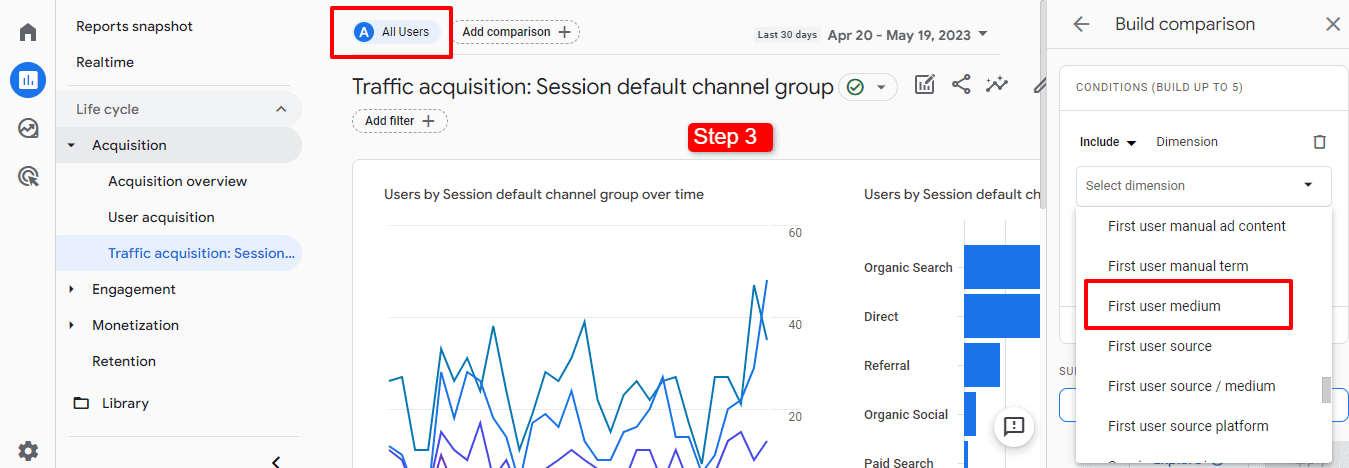
Step 4: Click on the Dimension Values ‘Organic’
In the final report, you can identify the number of organic sessions and understand how it correlates with the total session.
Conversions from Organic Traffic

Conversions are actions that the user takes on the website. It includes checking in, signing up, or subscribing to your newsletter for future updates. Tracking these metrics helps you provide insights into user behavior, and keyword performance which can ultimately enhance your marketing strategies.
Conversion tracking is considered to be the most straightforward way to correlate your marketing efforts with your revenue. You can track your conversions by setting up a Google Analytics account.
- If you are an e-commerce brand, conversion tracking can help you identify the number of conversions, the value, and the average order value by setting up specific eCommerce tracking.
- If you are using subscription-based software, with conversion tracking, you can track leads, signups, or paid subscriptions.
You’ve Finally Found the Right SEO Agency!
Capsicum has the SEO solutions you’ve been searching for. Don’t let another day go by where your competitors are looking down on you! It’s time to be discovered!
Get Started NowKeyword Rankings

The keyword ranking metrics helps you identify the visibility of your website for the keywords that you are targeting. Basically, when a website ranks at the top for certain keywords, it will receive higher click and traffic from users who are searching for that keyword and query on search engines.
There are various other ways tracking keyword ranking can help
- While tracking your keywords, you may discover that your website is ranking lower for certain keywords. You can update your SEO strategies to improve your rankings for those keywords.
- Tracking keywords can also help you monitor how your competitors are doing and identify the measures they are taking to improve their ranking. You can tweak your SEO strategies to get better results than them.
CTR

CTR, short for click-through rates, is an SEO metric which shares the ratio of clicks to impressions. It means the number of times your website was shown in search results for the keyword or keywords you are targeting.
A high CTR indicates your website is relevant to user’s search queries and also confirms that you are targeting the right keywords. A higher CTR also signifies higher conversion rates, which is also another important SEO metric we have already seen in this guide.
Like the other metrics, CTR can help evaluate the effectiveness of your SEO Strategy and identify opportunities where you are falling behind.
Engagement Rate
Engagement rate, one of the newest KPIs for SEO in Google Analytics 4, is quite essential to audience engagement. This metric shows the percentage of engagement sessions on a website.
When someone visits a website and sticks around for a while resulting in them taking a desired action or making a purchase, this can improve your website’s engagement rate, which is the inverse of a bounce rate.
You can use tools such as Google Analytics 4 to determine your engagement rate. If it is low, then you can use the insights from analytics to identify the issues that are causing low engagement and fix them.
Referring Domains
In order to understand the metric ‘referring domains’, you have to understand what a backlink is. When a website links to another website, it creates a backlink for the second website.
For example: Let’s assume that you own the website with the domain example.com
Now, the following three websites are websites that have referred to example.com by adding a link to the domain on their websites. These links are backlinks for the website example.com.
- example1.com
- example2.com
- example3.com
So, there could be n number of referring domains to your website. These n number of referring domains are the total referring domains for your website.
Why Do Referring Domains Matter?
When more websites start referring your content to the readers, it indicates that your website has a high authority and valuable content. Referring domains are a search engine ranking factor, however, you should keep in mind that the referring domains should also be high-quality domains. This can be determined with website authority metrics DA (Domain authority) and PA (Page Authority). This is why it is important that you keep tabs on referring domains for your website to ensure they are coming from trustworthy and relevant sources.
Duration of a Session
A user’s duration of a session is how much time a visitor spends on your website. It helps you determine if the visitors engage with the content on the website. This metric can help you identify gaps in your SEO strategies.
Your website’s average session duration will help you measure user engagement on the website. By monitoring the session duration of the visitor, you will be able to assess the quality of your website as well as understand whether it requires any changes or modifications.
If you want your user to stay for a longer session duration, it is important to build an in-depth content strategy. You’ll need to enrich your website with informative and valuable content that gives search engine users the answers to their search queries. In addition to upgrading your content strategy, you can also focus on building effective internal linking, breadcrumbs and menus for your website.
Type of Traffic: Branded vs Non-branded
Branded vs Non-branded traffic are important SEO KPIs since they help SEO experts and marketers understand the quality of traffic your website receives.
- Branded Traffic: Branded traffic, for instance, refers to people who are already aware of your brand and are looking for your company or website specifically. Brands with higher branded traffic already have a strong brand presence which can possibly impact a website’s SEO performance.
- Non-branded traffic: Non-branded traffic: Non-branded traffic refers to people who are just running a search on a general topic or keyword related to your business but may not know about your brand. A decent amount of non-branded traffic indicates that your brand is expanding and reaching new audiences. It can help improve your brand’s reach even more and bring in new potential customers.
Tracking these metrics will help you create a proper balance between branded and non-branded traffic to improve its SEO performance.
Conversions (Sales and Leads)
Conversions track how visitors become paying customers or potential clients (leads) and is considered one of the most important SEO KPIs. They are the lifeblood of your business. Understanding how many visitors convert helps measure marketing and sales effectiveness. By analyzing conversion rates, businesses can optimize campaigns to attract qualified leads and turn them into customers, ultimately boosting revenue. This makes conversions a crucial KPI for measuring marketing and sales success.
Customer Lifetime Value (CLV)
CLV predicts the total revenue a customer brings over their relationship with your business. Understanding this relationship helps businesses prioritize customer retention strategies and focus on high-value customers leads to increased profitability. Calculating CLV is essential for businesses as this can help you tailor marketing efforts to acquire customers with a higher lifetime value, leading to sustainable growth.
Cost Per Acquisition (CPA)
CPA measures the cost of acquiring a new customer or lead. Knowing your CPA helps optimize marketing spend. The knowledge of CPA can help you ideate which channels bring in customers at the lowest costs and can ultimately help your business to allocate resources more effectively. Thus, tracking CPA allows businesses to identify the most cost-efficient marketing channels for customer acquisition, maximizing return on investment (ROI).
ROI

ROI (Return On Investment) is an indicator that assists businesses in measuring their marketing campaigns. In order to calculate ROI for SEO, it is necessary to determine whether the net income compares to the money spent on optimizing the website.
The formula that can be used to calculate ROI percentage by a business is as follows:
Return On Investment = (Gain from Investment – Cost of Investment) / Total Cost of Investment
Return on investment (ROI) helps in calculating the exact amount a business can get back from the money they invest. A positive ROI should always be the ultimate goal of every SEO strategy. It offers confirmation that the time, as well as the resources invested in content, site maintenance, and outreach campaigns, have been worth it. Knowing the ROI target helps in measuring the brand’s performance against the measures employed regularly.
Google Business Profile Metrics
GBP metrics is one of the most important SEO metrics to track which showcases how customers interact with your business listing on Google Search and Maps. The knowledge and understanding of how customers find and engage with your profile helps optimize your online presence. Businesses which keep track of these metrics by analysing views, clicks, and calls are able to refine and retune their profile and attract more local customers.
Backlinks
Backlinks are links from other websites to your website. They act as votes of confidence from other websites, influencing your website’s search ranking. Earning backlinks from high-quality websites signals to search engines that your website is trustworthy and relevant, potentially boosting your organic search traffic.
Bounce Rate
Bounce rate is the percentage of visitors who leave your website after viewing only one page. A high bounce rate might indicate an issue with your website’s content or user experience.
Analyzing bounce rates helps identify pages that need improvement, allowing businesses to optimize their website for better engagement and conversions and therefore is a must add in list of KPIs for SEO to track.
Final Thoughts on Measuring Performance with SEO KPIs
By setting up KPIs and effectively measuring your SEO KPIs, you can focus your efforts on continuously measuring the performance of your marketing campaigns. Are you a business looking to track and report the progress of your website through selective KPIs?
If you are in search of SEO Services In Mumbai that will assist you in regularly analysing your site’s performance with the help of these essential KPIs, then your search ends here with Capsicum Mediaworks.
These factors can help you track and measure the performance of your SEO strategy. If you are interested in revamping your SEO strategy, here’s an SEO Checklist that can help you with your goals.
Want to Skyrocket Your Online Presence? Connect Now!
Call Us Now on +91 98330 94626 (Sales) or WhatsApp Us or send us an email to hello [at] capsicum [dot] in to discuss your project further!
- 45+ Strong Member Team.
- 650+ Clients Served Globally.
- 15+ Years of Experience.
- 23+ Int’l Countries Served.














